…and the struggle against them
![]()
To contact this site directly without sending a post for a specific page, write to: samfanto@riseup.net
This page is now just a reproduction of the original intro. The chronologies are now in the drop -down menu, though you can access them here (2020 – 2016) and here (2015 – 2013).
This page will be subject to regular updates, most notably in the chronology, but also in giving references to interesting texts (and also in the comments boxes at the bottom). So far (22/8/15), in addition to the chronology, I’ve only put in a couple of pretty minor personal experiences related to prison which follows the chronology, and some other reading material, which will be added to bit by bit. But I wanted to put this out in time for this week’s “solidarity with anarchist prisoners” (originally posted on 15th August 2015).
solidarity with US prison strike, 9/9/16
As the US prison strike keeps going, following FAM seems to provide pretty current news.
Also a prison radio show is online and has statements and updates.
This is dedicated to Keith LaMar, who in 1993 took part in a US prison uprising which united blacks with white “nazis” 1 against the prison system, in which 9 prisoners and one guard died. Keith LaMar has just had his final appeal against the death penalty turned down, and it looks very likely that, after over 22 years, he will be murdered by the state (look here and here). See also this from December 19th 2018.
Pictures of the Gordon riots in London 1780, when several prisons were liberated and the buildings set on fire
I’ve put this out as a kind of contribution to the International week of solidarity with anarchist prisoners (23-30 August 2015). A bit tokenistic maybe – as it’s only an internet page, but if there’s something going on in my part of the world (Montpellier, France) I’ll probably participate.
And whilst I really like, for instance, this from Emma Sheppard, why limit this solidarity to “anarchist prisoners”? Though obviously people who call themselves anarchists (I’m not one) are more in a position to express practical solidarity with prisoners who they know, do all those prisoners that they know call themselves anarchists? And on the most general level of information and propaganda, it seems far more worthwhile to address all prisoners, considering the necessity for the abolition of prisons and of the society that requires them. Addressing only anarchist prisoners does not contribute to the necessity to overcome separations between “political” prisoners and other class war prisoners (and the vast majority of those in prison are because of class society, especially property laws). It seems to make a hierarchy between apparently “politically conscious” prisoners and others, even though most anarchists want the abolition of prisons. Which is why below I’ve listed a chronology of all prison-related riots, escapes and other things taken from my News of Opposition page, dating back to March 2013, regardless of whether they involved anarchists or not.
***
Amongst those who claim to want an anti-state revolution, there have been some who believe that “after the revolution” there will still be specialists-in-order (anarcho-cops) and prisons. For instance, leading Libcom admin member Fall Back once called for, “far more complex, modern, well resourced kinds of ‘prisons’ with more progressive aims than currently exist…”communist prisons” …would be a place where people had broken laws would be forcibly detained”. 2 To talk about communist prisons being entirely different from capitalist prisons is like saying the communist State will be entirely different from the capitalist State: here so-called “anarchism” joins Leninism. Incarcerating anti-social leftovers of the mad alienation of class society (the recalcitrant ex-cops, ex-screws, mass-murdering politicians, mass-thieving bourgeoises, rapists, paedophiles, etc.) all in the same hellhole is obviously idiotic. If elements of communal constraint are necessary they will have nothing to do with the brutal repressive reality of prisons throughout history. To think that we’d call such forcible restraint a ‘prison’ is like calling ‘workers’ councils’ (or whatever term you’d like to imagine the future fantasy society to be) ‘the State’ or ‘the government’. This is not just a question of semantic terms but of a break with hierarchical notions and practices of social control. Killing scum is not the same as capital punishment. Forcible restraint is not the same as prison. A margin of rationing (where scarcity is not forced by capitalist property relations but comes about because of, for example, differences between different geographical areas) is not money. Obviously in this future possibility there will be some way of punishing people who act in ways the community they’re part of find unbearable. But it’s not just semantics that separates, say, “grounding” a teenage kid from the idea of putting him/her in prison, but a general attitude that you want social relations to constantly experiment with changes that have some healthy result. If we talk about the abolition of the State that also means abolishing specialists in social control; the task of determining the methods of making it clear to people that certain behaviour is unacceptable will be the task of the whole of the anti-hierarchical community. To ground this in the past and present: what punishments have we received or given that we considered changed a situation for the good? What punishments during intense moments of class struggle have changed situations for the good? What punishments are we prepared to mete out to those we consider beyond the pale? To anyone not clogged up with dominant perspectives, prison isn’t an answer to any of these.
Added 9/9/16: these pages (1, 2, 3 ) about Attica, 1971 (scroll down to the last paragraph of page 1 for the start). “We, the inmates of Attica prison, say to you, the sincere people of society, the prison system of which your courts have rendered unto, is without question the authoritative fangs of a coward in power” – The Popular Manifesto of Attica, September 1971.
See also this about the European maxi-prisons.
And this about the 1990 Strangeways prison riot, when prisoners took over much of the prison for several days: Strangeways 1990: A serious disturbance which, despite being co-written by a member of a dreadful Leftist organisation (the Bolshevik organisation Revolutionary Communist Group) is an excellent read; its other author is an ex-prisoner.
And this: “mental illness & solitary confinement in Texas prisons”
Recommended: prison writings of John Bowden
A couple of very minor personal experiences
1.
At the age of 19, I had my only very short-lived experience of being imprisoned. I’d been arrested for “insulting behaviour” putting on a “guerrillla theatre”-type agit-prop play outside a school in Kings Cross, which caused a semi-riot. We were packed off to Ashford Remand Centre, even though our parents had turned up in court to put up surety for the bail which most of us had been granted (the only one of us that wasn’t was a couple of years older than us, the only one of us who was from a working class background – he went to Brixton for a week before bail was granted). Ashford, though technically a “remand centre” was no different from an ordinary prison – prison gate, barbed wire on the fencing, etc. There we were made to have a public cough ‘n’ drop medical inspection. In fact, this was the most humiliating moment for me – being forced to undress in a hallway surrounded by cells consisting solely of bars (no walls) and being examined naked whilst being stared at by several screws and prisoners whilst my balls were held by a doctor to see if I’d had a hernia or something (being a virgin probably made me feel even more anxious about being naked in front of so many people). And then made to have a semi-public bath. We then had to wear prison clothes: my trousers were far too big – I had to permanently hold them to stop them falling down (no belts allowed), and my shoes were far too small, cramping my toes.
The cell smelled half the time of piss – someone had thrown out his slpping out pot out of the cell above and the piss had hit the outward opening window, hinged at the bottom, and the piss had run back down into my cell. Unable to sleep due to the proximity of London airport and a railway line (though the window was too far up to look out of), plus the ever-echoing sound of slamming doors or footsteps along the concrete corridor, I somehow half-composed the following in my mind (no pens or paper and only a Western, with half the pages torn out, to read) and wrote it up properly as soon as I got out – a slightly pretentious poetic-type of attempt at something influenced by the surrealists, but which, despite its literary rhetorical style, also genuinely expresses some life-affirming emotions:
SOCIETY IS A PRISON – OPEN UP THE PRISONS!
There is no freedom for the enemies of freedom, the slaves of their hate and fear of freedom. Inside the corridors of tyranny the jackboots, the truncheons, the barred windows, the barred wire, the barbed wire, the 40 foot high double electrified fencing – are all screaming out the admittance of THEIR failure to exterminate OUR minds. Their judgements, their amnesties, their reprieves, their mercy – are the judgements, the amnesties, the reprieves, the mercy of the dead to the living – the dead beckoning the living to join them in the graveyard. Soon, from the warm comfort of their coffins, six foot under, they will wake up to find their nightmares becoming reality – obscene words painted on their gravestones, shit smeared over the epitaph, and finally their coffins disinterred and thrown into the burning astreets. Soon freedom, the imagination, bruised, castrated, decapitated, buried alive in the dungeons of Pentonville and Ashford – soon, the imagination running riot, shall rise up, shatter the walls and gates, smash the locks, burn down the factories of pain and misery, and seize total power! The dictatorship of the imagination!
It was only 24 hours, but when it’s your first time in prison and you’ve got no idea how long you’ll be there, and you’ve never known anyone who’s been inside, it was a little worrying, though it was the boredom I remember most, because we were kept isolated for most of the time. I was so naïve, I remember being really outraged at the fact that teenagers were kept in prison without bail for 6 months or more before trial, at which they were often let off. (see this, for the context of this arrest and the subsequent trial).
2. On July 14th 2013, I was in St.Louis with my daughter at a demo called the day after George Zimmerman, Trayvon Martin’s killer, was found “not guilty”. This happened at the end of the demo:
So it’s pissing down and we all loudly head back toward what I somehow thought was the town courthouse, and I go first into the little vestibule banging a saucepan very noisily. Everybody else seemed a little hesitant, like I’d stepped over an invisible barrier that everybody normally respected. But then this was the vestibule of the city jail, and not merely a courthouse as I’d assumed. Fools rush in where angels fear to tread. The noise we were making was deafening, and seemed to echo into the area beyond the glass doors we were not going through. I suggested going further than the vestibule. Fools rush in where angels fear to tread, urging others to join them. Ignorance is bliss. A masked guy (Zorro? the Lone Ranger? Billy the Kid?) ran in and chucked the only thing that moved – a floor mat. When he returned a bit later, and threw in some flowers that he’d just picked from outside the jail, a black woman got upset – “This is meant to be a peaceful demonstration – Trayvon Martin’s family insisted it should be peaceful”. What sad/mad times these are when throwing flowers is somehow thought of as not peaceful enough.
“Fools rush in where angels fear to tread
Angels never go to war – they masturbate instead”
We then retreat from the jail as we get pushed out by armed guards. A few minutes later the courthouse is surrounded by heavily armoured riot cops with their sticks at the ready, the TV cameras reappearing for the first time since the downpour. We all go off back to our cars, and then off to a birthday party of a woman friend of my friends. She was born on July 14th, famous in France for what happened in 1789 – Bastille Day – appropriate, since we’d “stormed” the city jail. Well, almost – the vestibule…still, it sounds good – “WE STORMED THE CITY JAIL!!! – ON BASTILLE DAY!!!!!”
– from here
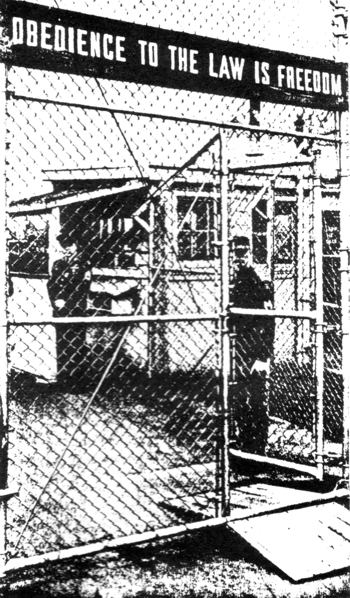
Ideology materialised
The list below has only just begun (22/8/15) (see also the comments box below this page for some additional material):
Prison writings of John Bowden “…pieces written over the years by John Bowden, a ‘social prisoner’ who has been radicalised by his long years at the sharp end of the British justice system. That same system has sought to silence him for many years, including accusing him of associating with terrorists, namely Brighton ABC, and his writings have repeatedly been used against him in parole hearing as a reason not to release him despite his being years over his original tariff.” Some of his stuff is rather Leftist (eg use of the term Islamophobia, when what is meant is racism towards Muslims, which are not the same thing: it’s obvious that Islam, like all religions, should be critiqued, particularly as Leftists often are really idiotic in response to anybody criticising Islam). Doubtless there are other things with which I disagree, but I have yet to read all his writings.
Victor Serge’s “Men in Prison” (1914) “Modern prisons are imperfectable since they are perfect. There is nothing left to do but to destroy them”.
Os Cangaceiros: freedom is the crime that contains all crimes (1985). About the prison revolts throughout France in 1985. Alsothis by Os Cangaceirosabout the theft of architectural plans for prison construction by this group, and some parts of this which put both of the above in context.
This has some interesting things to say about the Attica uprising in September 1971.
This has a report of the 18 (at least) prisons that took part in an uprising in the UK in spring 1986 (see entries for 29/4/86 to 3/5/86 on pages 31 – 34 ). “The UK, 30th April 1986: THE MOST BEAUTIFUL EVENT OF THE YEAR. Between 18 and 21 prisons (depending on which figures you accept) involved in varying degrees of ‘disturbance’. 841 gaol places (just under 2% of the total) are destroyed….
Northeye prison, Sussex, UK – destroyed by rioting prisoners
Strangeways 1990: A serious disturbanceThe riot at Strangeways prison in Manchester, UK lasted for over 3 weeks during April 1986 and involved fires, the virtual destruction of the prison and a rooftop occupation. Despite being co-written by a member of a dreadful Leftist organisation (the Bolshevik organisation Revolutionary Communist Group) this book is an excellent read; its other author is an ex-prisoner.
Prison riotsA pdf of accounts of various riots, including Strangeways, 1990 but also other riots around the world: Hull 1976, various riots in state capitalist Russia’s gulags, various US prison riots of the 20th century, Australian riots, etc.
Alexander Berkman’s “Prison Memoirs of an Anarchist”
Bad – the autobiography of James Carr – and this online version of the afterword. “Bad is one of many books written by prisoners who have become radicalised by their experiences in American jails. However it stands out from a lot of the others because it avoids portraying the prisoner as a passive victim of social injustice – and also refuses the martyr role that liberals and leftists try to impose on convicts as a vehicle for their own fantasies and careers (whether as social workers, sociologists, politicians or “professional revolutionaries”). Freed from all these limitations James Carr was able to tell his story, warts and all, without worrying about what might or might not alienate liberal/leftist support. So, there is no glossing over his involvement in gang rapes, protection rackets or any of the more horrific aspects of his daily life in jail – nor are there any useless guilty apologies for his past. (Anyway, the story of his development makes clear his eventual understanding of why the prison regime deliberately encouraged this kind of divisive behaviour.)” These are some recordings of Jimmy Carr which were made for the book.“James “Jimmy” Carr, founder of the Wolf Pack, an infamous prison gang in California during the 1960s, tells the story of life behind bars. Carr had unique experiences in the prison system as he was at seventeen still a juvenile and incarcerated in California’s oldest correctional facility. The incidents described on this album are taken from tapes Carr recorded as testimonial of his time in prison, and his evolution as a leader.”
L’envolée This is a regular anti-prison journal and website in French. Pi writes: It is one of the few papers addressing prison issues with a radical perspective but not focusing on anarchist or “political” prisoners.
This pdfis the latest issue, dedicated to Hafed Benotman, a rebel prisoner and writer who considered himself a thief. He wrote beautiful books: a moving autobiography, excellent novels, short stories, and was one of the co-founders of L’Envolée. This issue contains extracts of his works. He evokes outlaws’ and delinquents’ lives in many of his works, though there is much more than that. His reflections on prison life in France are brilliant, and even fundamental, as he evokes all its aspects: for example sexuality, or the role of Islam in diverting prisoners’ combativity and accepting their fate.
Footnotes
1Apparently in US prisons, you are effectively forced to join one gang or another, divided on racial grounds. Whites who do not join the nazis have to go to black or Latino gangs for protection, but this is risky. If the black or Latino gang refuses you, you lay yourself open to horrific brutality from the nazis, since they will automatically hear of what most of them would consider as “betraying your race”.
2 This comment was originally posted on a thread about prison guards going on strike. Significantly, it has disappeared down the memory hole. Though reactions to the comments exist, Fall Back has airbrushed his own reflections from the thread. It is one thing to be embarassed by one’s past, it is another to hide and falsify it. I should just add that, though I have no respect whatsoever for libcom admin, they do not – as far as I know- have a collective line on prisons, and I doubt if any of the others have voiced such a Leninist perspective as openly as Fall Back.
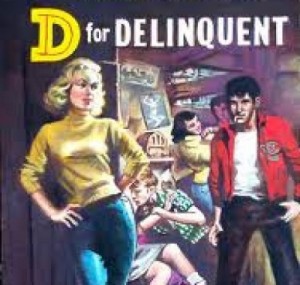
Hits as of 2/1/18: 7244
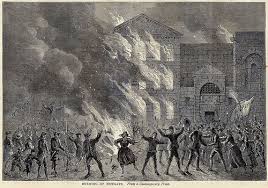
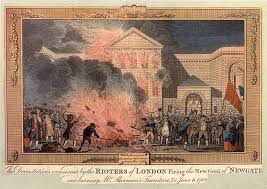
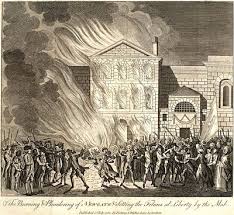
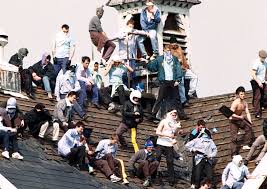

Leave a Reply